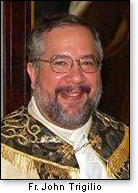
Matt C. Abbott
Grey area: the morality of investigative journalism
By Matt C. Abbott
I asked noted Catholic priest-author-theologian Father John Trigilio to weigh in on the morality of "undercover"/investigative journalism, a topic featured in my Feb. 10 and Feb. 14 columns. Father graciously provided me with the following analysis:
February 25, 2010
I asked noted Catholic priest-author-theologian Father John Trigilio to weigh in on the morality of "undercover"/investigative journalism, a topic featured in my Feb. 10 and Feb. 14 columns. Father graciously provided me with the following analysis:
-
'On the one hand, the natural moral law teaches that the ends never justify the means, hence, lying is never permitted for any reason whatsoever, even to save lives. The Catechism defines lying as the deliberate speaking of falsehood with the intention to deceive.
'On the other hand, not all deception is considered lying. Deceptions such as literary or cinematic fiction; prestidigitation (sleight of hand); theatrical illusions and special effects; television, stage or film acting; fairy tales, jokes, etc., are not lies and are morally permitted since they are defined as entertainment.
 'The moral quandary arises in the case of undercover work. Police, FBI, CIA, Mi6, etc., employ undercover techniques to identify and capture criminals. The spy who infiltrates Al-Qaeda uses a pseudonym (a cover). Like an actor, he pretends to be someone else. Likewise for the undercover narcotics cop who is assembling evidence to arrest and convict a drug dealer. These are not instances of lying but a use of broad mental reservation and equivocation.
'The moral quandary arises in the case of undercover work. Police, FBI, CIA, Mi6, etc., employ undercover techniques to identify and capture criminals. The spy who infiltrates Al-Qaeda uses a pseudonym (a cover). Like an actor, he pretends to be someone else. Likewise for the undercover narcotics cop who is assembling evidence to arrest and convict a drug dealer. These are not instances of lying but a use of broad mental reservation and equivocation.'What is not acceptable, however, is entrapment. That is morally wrong, for the undercover agent becomes the occasion of sin and the catalyst for the crime. The morally permissible method is observation rather than instigation. An undercover cop pretends to be a janitor and uses this job to keep surveillance on known felons. He is doing nothing wrong in reporting what he has seen and heard. If, however, he becomes a player in the game and invites and encourages others to commit a crime rather than just observe one about to happen, it is entrapment and it is immoral.
'I have hesitation with indiscriminately any reporter or journalist doing undercover work. Unlike professional spies and undercover police who undergo some special training, the press and media get no professional instructions on covert operations. A cop, be he local, federal or international, is authorized by a legitimate authority who cares for the common good. A reporter works for a newspaper or news media outlet. While we have freedom of the press and it considers itself the Fourth Estate, in reality, it is also a business that vies with competitors.
'I have pause when undercover journalists have 'sting' operations, for they operate under different rules than that of the military. There must be a distinction between reporting the news and making the news. Seeking the truth is a noble and honorable thing, and many reputable journalists do just that. A few, however, can become overzealous or, in a secular yearning for sensationalism, blur the moral lines and merely seek headlines.
'There is no moral problem with hidden cameras and microphones exposing the illegal and immoral activities of others if the purpose is to expose and stop the evil deeds from continuing to happen. What I hesitate about is the incidents where undercover reporters entice and entrap potential criminals into becoming real ones. Mental reservation is not an accident; it takes effort and practice. There are also restrictions and limitations, just as there are with free speech.
'The confidentiality and secrecy of the seal of confession is such that there can be no violation whatsoever. Yet, even there, as a confessor, I am not allowed to lie. I merely equivocate or use mental reservation to withhold facts and information since other parties have no right to know what I know.
'When someone pretends to be someone else, it is not de facto lying. When they attempt or actually initiate criminal or immoral behavior, however, they become material cooperators in evil even though they may not be formal cooperators. Techniques need to be evaluated as in all moral actions. Intentions alone do not make a moral act permissible. Moral means must coincide with a moral end (in other words, good means + good end = good act).
'Caution needs to be urged since we as Americans tend to engage in unrestrictive behavior at times. Not all investigative journalism, just as not all undercover police work or all national security covert operations, is morally acceptable. A measuring rod of ethics is always needed in any human activity to discern the morality of an act even if the intention and the ends are considered good.
'This is why this debate is necessary and honorable. It is not helpful to demonize either side of the argument but we must respect and uphold moral principles and never allow compromise. Precise application of the natural moral law often takes a little more time and effort, but in the long run, it's well worth it.'
The views expressed by RenewAmerica columnists are their own and do not necessarily reflect the position of RenewAmerica or its affiliates.
(See RenewAmerica's publishing standards.)



















